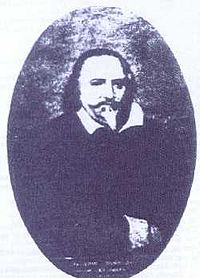Giovanni Francesco Busenello
Giovanni Francesco Busenello (born September 24, 1598 in Venice , † October 27, 1659 in Legnaro near Padua ) was an Italian lawyer, librettist and poet.
Busenello came from a respected Venetian family and studied law at the University of Padua , where he also studied law . a. Paolo Sarpi and Cesare Cremonini heard. From 1623 he worked as a lawyer in Venice. He was also vicar. At times he was also the Venetian ambassador to Mantua . In Venice he was a member of several literary academies, the Umoristi, Imperfetti and in particular the Accademia degli Incogniti, which was important for the development of opera.
During his time the opera in Venice experienced a great boom. He wrote opera libretti for Francesco Cavalli and Claudio Monteverdi . His libretto for Gli amori d'Apollo e di Dafne (1640) by Cavalli was based on the shepherd novel Il Pastor Fido by Giovanni Battista Guarini . Other operas for Cavalli were La Didone (1641), La proserpita infelice di Giulio Cesare dittatore (1646, the opera is lost) and Statira, Princess of Persia (1655). For Monteverdi, who met Busenello through his pupil Cavalli, he wrote L'incoronazione di Poppea (1642), an early operatic masterpiece, shortly before his death , the libretto of which does not follow mythological, but historical models ( Tacitus ) and is characterized by psychological complexity that distinguishes characters. Busenello also wrote a few novels in which he describes the relaxed life in Venice of his time.
literature
- Jean-François Lattarico: Busenello: Un théâtre de la rhétorique , Paris, 2013
- PJ Smith: The Tenth Muse: A Historical Study of the Opera Libretto , New York, 1970
- W. Heller: Tacitus Incognito: Opera as History in L'incoronazione di Poppea , Journal of the American Musicological Society, Vol. 52, 1999, pp. 39-96.
- I. Fenlon and P. Miller: The Song of the Soul: Understanding Poppea , London, 1992
- Jean-François Lattarico: Venise incognita. Essai sur l'académie libertine du XVIIe siècle , Paris, 2012
Web links
- Works by and about Giovanni Francesco Busenello in the catalog of the German National Library
| personal data | |
|---|---|
| SURNAME | Busenello, Giovanni Francesco |
| BRIEF DESCRIPTION | Italian librettist and poet |
| DATE OF BIRTH | September 24, 1598 |
| PLACE OF BIRTH | Venice |
| DATE OF DEATH | October 27, 1659 |
| Place of death | Legnaro near Padua |
